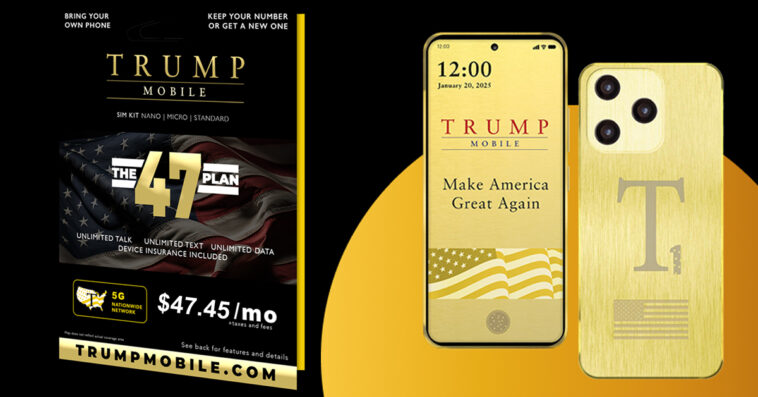In a bold new venture mixing business with patriotism, the Trump Organization has launched Trump Mobile—a wireless service featuring U.S.-only call centers and a proudly “America First” identity. Unveiled by Donald Trump Jr. and Eric Trump on June 16th, the launch includes a $499 gold-toned smartphone and a $47.45 monthly plan with perks such as telehealth and roadside assistance. With U.S.-based support and MAGA-style branding, Trump Mobile enters a crowded market often criticized for outsourcing. Read on to see how the Trump family’s latest tech play taps into nationalist sentiment—and why some say it’s more politics than performance.
Unpacking Trump Mobile: Plans, Perks, and Patriotism
Stepping into the competitive wireless arena, the Trump Organization has officially launched its own mobile network, aptly named Trump Mobile. At the heart of their offering is “The 47 Plan,” a flagship 5G service priced at $47.45 per month. This specific figure is a clear nod to Donald Trump’s presidential terms, a symbolic tie-in that aligns with the brand’s overarching “America First” identity. The timing of this launch is also significant, coinciding with the 10-year anniversary of the commencement of Trump’s initial presidential campaign.
The 47 Plan aims to provide comprehensive connectivity, featuring unlimited talk, text, and data. While the specific underlying carriers aren’t explicitly named by Trump Mobile, the service is accessible via what are described as three major cellular providers, strongly suggesting Verizon, AT&T, and T-Mobile.
Beyond standard mobile connectivity, Trump Mobile aims to differentiate itself with a suite of value-added services. The plan includes free international calling to 100 countries, and in a gesture highlighted by Eric Trump, Executive Vice President of the Trump Organization, it extends free long-distance calling for military members and their families.
Further sweetening the deal, The 47 Plan boasts several unique benefits:
- 24/7 roadside assistance provided through Drive America.
- Comprehensive telehealth services, encompassing virtual medical care, mental health support, and convenient prescription ordering and delivery.
- A commitment to flexibility with no contracts and no credit checks required.
This combination of patriotic branding, robust service, and a diverse array of perks positions Trump Mobile as more than just a cellular provider; it’s a strategic venture designed to appeal to a specific segment of the American populace.
“Trump Mobile is going to change the game, we’re building on the movement to put America first, and we will deliver the highest levels of quality and service,” Trump Jr. stated in a news release.
Introducing the T1 Phone: Trump Mobile’s Hardware Offering
Beyond its wireless service, Trump Mobile is also set to launch its own branded smartphone, dubbed the T1 Phone. This device will carry a retail price of $499, with a $100 down payment option available for customers.
The T1 Phone is built on the Android operating system, according to information on Trump Mobile’s website. For security and convenience, it will feature both AI face unlocking and an internal fingerprint sensor.
In terms of specifications, the T1 Phone will come equipped with 256 gigabytes of internal storage and 12 gigabytes of RAM storage. It’s slated to run on the Android 15 system and will include both a USB-C port and a 3.5 mm headphone jack.
While an official release date for the T1 Phone has not yet been announced, eager customers can pre-order the device directly from the Trump Mobile website.
Trump Mobile’s All-American Promise
Trump Mobile is making a firm commitment to keeping its operations entirely within the United States, a stance strongly articulated by Eric Trump, Executive Vice President of the Trump Organization. In a recent interview on Fox Business’ Mornings with Maria on June 16th, Eric Trump declared that Trump Mobile is “going to revolutionize cell phones, mobile calling.”
He emphasized the domestic focus of the new venture, stating, “You’re not calling up call centers in Bangladesh − do it right out of St. Louis, Missouri, and you’re going to have phones that are made right here in the United States of America.”
The second eldest Trump son also highlighted the Trump Organization’s expanding presence in the technology sector, pointing to their existing social media platform, Truth Social, and the crypto venture, World Liberty Financial. “I really believe we’re gonna have one of the great kind of tech platforms as part of the Trump Organization of any company in the world,” he said, signaling ambitious plans for their tech endeavors.
Can Trump Mobile Succeed? Here’s What Could Make or Break It
Trump Mobile’s success will hinge on a mix of brand loyalty, market strategy, and political positioning. On one hand, it has some clear advantages. Donald Trump’s massive and devoted base could provide a strong starting customer pool, especially among those drawn to the service’s patriotic branding, U.S.-based call centers, and military-friendly perks. By using existing networks like Verizon or AT&T, Trump Mobile may offer reliable coverage without building its own infrastructure. Features like no contracts, no credit checks, and extras such as telehealth and roadside assistance could also appeal to budget-conscious or underserved users.
However, the service faces significant challenges. The U.S. wireless market is already saturated with major players offering competitive rates and feature-rich plans. Trump Mobile’s overt political branding may also limit its appeal to a broader audience and potentially draw backlash. While the T1 phone includes solid specs, it doesn’t offer groundbreaking technology, and past Trump-branded business ventures have had mixed results.
In the end, Trump Mobile could enjoy short-term success within Trump’s core base, but breaking into the mainstream telecom space will require more than branding—it will demand competitive pricing, solid customer service, and the ability to attract users outside its political niche.
Source: USA Today

